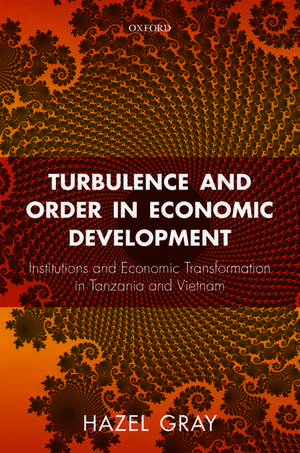Turbulence and Order in Economic Development: Institutions and Economic Transformation in Tanzania and Vietnam
Autor Hazel Grayen Limba Engleză Hardback – 15 feb 2018
The terms of debate on the role of institutions in economic development are changing. Stable market institutions, in particular, secure private property rights and democratically accountable governments that uphold the rule of law, are widely seen to be a pre-requisite for economic transformation in low income countries, yet over the last thirty years, economic growth and structural transformation has surged forward in a range of countries where market and stateinstitutions have differed these ideals, as well as from each other. Turbulence and Order in Economic Development studies the role of the state in two such countries, examining the interplay between market liberalization, institutions, and the distribution of power in Tanzania and Vietnam.Tanzania and Vietnam were two of the poorest countries in the world in the early 1980s but over the last thirty years, both have experienced significant changes in the pace and character of economic development. While both countries experienced faster rates of GDP growth, their paths of economic transformation were very different as Vietnam experienced rapid poverty reduction associated with the expansion of manufacturing while Tanzania's path of industrialization was characterized by the riseof mining and a much slower pace of poverty reduction. Employing a political settlements approach, this book considers the comparative role of the state in driving economic transformation. In both countries, the experiences of socialism continued to shape the role of the state in the economy evenafter extensive market liberalization, however, the distribution of political and economic power was very different. This had important consequences for the overlapping role of the state in generating political order and in driving economic transformation. Turbulence and Order in Economic Development studies the formal and informal ways that the state influenced economic transformation through its role in public financial management, land and industrial policy.
Preț: 529.13 lei
Preț vechi: 714.96 lei
-26% Nou
101.28€ • 110.05$ • 85.13£
Carte tipărită la comandă
Livrare economică 10-16 aprilie
Specificații
ISBN-10: 0198714645
Pagini: 264
Dimensiuni: 164 x 239 x 24 mm
Greutate: 0.57 kg
Editura: OUP OXFORD
Colecția OUP Oxford
Locul publicării:Oxford, United Kingdom
Recenzii
The originality of the book lies in transcending some of the limits of other approaches to political settlements, in particular their focus on state centralization and assumptions of the overriding dominance of clientelism. The book provides a genuine political economy of economic transformation that examines the historical context and different forms in which power was obtained and used to drive economic change in Tanzania and Vietnam. By setting out the contours of a socialist political settlement, the book explores the emergence of informalization within the state itself and the consequences of this for economic transformation.
Hazel Gray's book, written with clarity and conviction, makes a compelling case for the insights that careful, comparative field research and heterodox economics can offer to students of economic development.
A highly original and compelling contribution to the political economy of economic transformation, this book is packed with detail and fresh insight into the paths followed over recent decades in each of its focus countries, Vietnam and Tanzania. Drawing on political settlements theory, it contains the best account yet of the divergent trajectories of these countries: how their former socialist settlements unravelled, the way different types of off-budget transfers and contrasting land rights shaped patterns of investment, and the effectiveness of approaches to industrial policy.
This book has made a considerable contribution to the discourse on the role of institutions in economic development based on the experience of two former socialist countries, Tanzania and Vietnam. Addressing the role of the state in economic transformation in the two low income countries, the book shows that the paths in economic transformation that the two countries took as they transitioned from socialist to more open market economies demonstrates different paths in economic transformation. The most significant contribution of this book is in the way it has generated new insights into the role of institutions in low income countries and in the variable relationship between political order and economic outcomes. The book makes very useful reading to students and specialists in development and the role of institutions in development.
It is now almost universally recognised that the state played an active role in transforming the economies of the Asian tigers and China. A study which looks at what this means for theory is therefore very welcome. This book does this by comparing the economies of Vietnam and Tanzania, both of which emerged from periods of socialism in 1986. The author shows that the comparative success of Vietnam came from a socialist political settlement in which the state promoted policies to improve the productivity of small-scale agriculture and to rapidly expand exports of labour-intensive manufactured products. Tanzania, in contrast, remained with a high-cost agriculture, which fed into wage costs, and made it difficult to export manufactured goods. This book should be read by anyone interested in economic strategies and the contrasting possible roles of the state.
Notă biografică
Hazel Gray is a lecturer at the Centre of African Studies at the University of Edinburgh. Her research covers the comparative political economy of development, industrial policy, and economic transformation. Previously she worked at the London School of Economics and at SOAS. She worked as an economist at the Ministry of Finance in Tanzania and has been a lead author for Tanzania's UNDP Human Development Report.


















